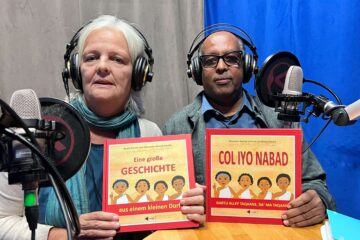Vienna, 17 Januar 2024: Yesterday in the seminar room 1 of the Department of African Studies of the University of Vienna, Rémi Tchokothe presented his new book entitled “Entré en tant que cousin, sorti en tant que gendarme’ – Visa Balladur, Kwassa Kwassa, (im)mobilité et géopoét(h)ique relationnelle aux Comores” – “(S)he came as a cousin and left as a gendarme” – Balladur “Visa of Death”, Kwassa Kwassa and (Im)mobility in the Comoros”. The 90-minute event was moderated by Daniela Waldburger, a senior lecturer at the same department. We from the freshVibes team were there, and we recorded this European premiere, which you can listen to in full here.
–
« She came as a cousin and left as a gendarme. » This anecdote captures both the identity paradox of the Comoros and the ‘migration’ drama that has occurred there since the arbitrary 1995 introduction of the Balladur Visa by the French government. Mayotte has been labelled “the biggest marine graveyard in the world” because of the death of thousands of people who wanted to reach Mayotte in teetering boats known as Kwassa Kwassa. How can works of imagination that describe “migration” from the neighbouring island of Anjouan to the ‘French’ territory of Mayotte constitute a kind of collective social therapy and social intervention? This book answers this and other urgent literary, human, and sociopolitical questions through a study of 18 works of fiction, combining literary studies with anthropology, international law, sociology, and history.
This book is the product of nearly 6 years of intensive research, years of doubting standard methods, years of dealing with an anthropology of anger with geopolitical injustices and neocolonial politics, years of meeting the right people, years of developing new relational research methods, years of lockdown unlocking the writing process, years of joy, and years of frustration by the peer review process, etc. These years of struggle have been worthwhile: the book is available in open access format, thanks to funding from the Cluster of Excellence: Africa Multiple: Reconfiguring African Studies at the University of Bayreuth, where Rémi Tchokothe began the project before joining the University of Vienna.
In this conversation, Rémi Tchokothe answered many questions from Daniela Waldburger, who has studied the Comoros and is currently designing a research project on Language in Violence and Violence of Language in Mayotte.
> A free copy available is available here
Keywords: ‘Black Skin, White Masks’; ‘Balladur Visa’; Comoros Archipelago; ‘Geographies of Sensibilities’; ‘Le Pleurer-Rire’; Youth Violence; Kwassa Kwassa; Intersectional (Im)mobility


















